Did our ancient ancestors know that bone broth was good for the digestive tract? They must have on some level since long before science was even “a thing,” they were cooking bones and gristle over an open fire to extract the nutritious elixirs inside.
These days researchers are discovering the direct reasons why bone broth for gut health is so valuable, including benefits for the immune system and just about everything else in the body.
If you’ve ever wondered “does bone broth really heal the gut?”… read on for 6 important ways that bone broth is good news for your gut AND your whole body!
Reason #1: Collagen
Let’s start with the most obvious reason why you’re hearing a lot more about bone broth for gut health these days… bone broth is a huge source of at least 3 types of collagen.
Collagen type 1 is the most abundant kind of collagen found in the bones and bodies of mammals, and thus in bone broth.
Not only is type 1 collagen essential for creating nails, hair, skin, and bones, it’s also found in high amounts in the digestive tract – and for good reason. This type of collagen is what the lining of our intestines, in large part, is made of.

The body uses type 1 collagen, in particular, for maintaining, repairing, and healing the intestinal lining. As far back as the early 1980s, researchers were discovering the power of collagen type 1 for repairing mucosal linings as well as rebalancing gastric juices in the stomach [1].
In 2012, a Brazilian team found that a combination of whey protein and collagen supplementation protected the GI tract against ulcerative lesions [2].
Type 2 collagen helps to build protein molecules in cartilage. It’s also highly beneficial, which is why you want to include joint bones in your broth if you make healing bone broth at home.
Finally, type 3 collagen can be thought of as a “helper substance” for collagen type 1. It’s found in large quantities everywhere type 1 can be found, including in the intestines.
Reason #2: Essential Amino Acids
In 2017, a study sponsored in part by the University of New Mexico’s School of Medicine in Albuquerque showed that people with certain digestive conditions, such as irritable bowel syndrome (IBS), maintain lower levels of amino acid levels in general [3]. The researchers also postulated that increasing amino acid content through food and supplementation could help digestive symptoms.
Bone broth contains many key amino acids that add another layer of healing for your gut. Both glycine and proline are amino acids found in bone broth that are essentials for brain and gut health [4].
Proline has been found to benefit lymph tissue in the gut as well as support intestinal healing [5].
Glycine is intricately involved in digestive health as well. It helps to maintain the correct acidity levels in the digestive tract and assists in the breakdown of fatty acids from food [6].
Reason #3: Glutamine
One of the superstar amino acids for gut health is glutamine (also called L-glutamine). Another reason why bone broth is so amazing for healing digestion is that it contains high concentrations of this substance.

The body requires approximately 20 essential amino acids to create the proteins which allow your body to function in a healthy way. L-Glutamine is one of these essential amino acids and is typically the most abundant amino acid in your system.
Approximately 60% of the skeletal muscle of the body is made up of glutamine and it’s important for brain and muscle health as well. The body can make it endogenously (originating internally) and it’s also found in food. Sadly, however, most people in the modern world are deficient in glutamine.
A 2017 study conducted at Rouen University Hospital in Rouen, France, found that:
“Glutamine supplementation can improve gut barrier function in several experimental conditions of injury and in some clinical situations [7].”
The researchers also noted that glutamine and other substances found in bone broth are beneficial for overall digestion.
Reason #4: Anti-Inflammatory Properties
Many compounds found in bone broth are anti-inflammatory, which can be of big benefit if you’re suffering from conditions such as diverticulitis, IBS, or Crohn’s disease [8].
Gelatin is one substance in bone broth that has been found to help calm inflammation. Gelatin is a simple substance but its power for healing lies in its ability to retain water. Ingesting gelatin in bone broth can provide another protective layer to your intestinal lining that can seal the gut and keep pathogenic (disease-causing) microbes at bay.
A 2012 Italian study discovered that both gelatin and glycine found in bone broth can reduce the inflammation that pro-inflammatory lipopolysaccharides (LPSs) are known to cause [9]. LPSs are located on the outer parts of harmful gram-negative bacteria.
(Gram-negative bacteria are often responsible for infections in healthcare settings and include Klebsiella, Acinetobacter, Pseudomonas aeruginosa, and E. coli, among many others.)

Another interesting study conducted by the Nebraska Medical Center took their cue from long-held traditional beliefs in chicken soup’s ability to “cure the common cold” and other respiratory infections.
These researchers found that both the chicken stock and the vegetable components of the soup contained substances that would cause this effect, but that the chicken stock’s anti-inflammatory components were of particular importance. In in vitro investigations, researchers found that substances in the stock, in particular, had the ability to inhibit the growth of neutrophils – pro-inflammatory immune system cells.
Reason # 5: Bone Broth for Leaky Gut & Improved Immunity
If you suffer from “leaky gut” (intestinal permeability), those mechanisms that are supposed to be protecting your digestive system from the rest of your body begin to break down.
“Tight junctions” as well as intestinal components called Glycosaminoglycans (or GAGS), which help form the tissue fibers of the intestinal lining, become defective. This allows pathogens to breach intestinal barriers, cause inflammation, and wreak havoc on your system.
Remember that up to 80% of all your immune system cells rest in the upper intestinal area of the digestive system. The connection between gut health and immune health has been confirmed by many studies over the last few decades. Likewise, the link between leaky gut and autoimmune disease has been firmly established [10].
Bone broth contains high levels of GAGs and helps to “heal and seal” the intestinal lining and heal leaky gut. When you heal the intestines, you naturally strengthen the immune system as well.
Reason #6: Vitamins & Minerals
Finally, bone broth contains dozens of other substances, including essential vitamins and minerals that are beneficial for not only the gut but for the vibrant functioning of the entire body [11].
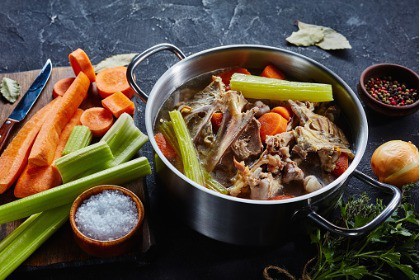
Just some of the vitamins and minerals found in bone broth include:
- Vitamin K, which assists in the healthy flourishing of beneficial bacteria in the gut and is also needed to synthesize calcium [12]
- B vitamins, all of which help to stabilize the gut microbiome in different ways [13]
- Magnesium, essential for maintaining gut bacteria balance [14]
- Iron, also helpful for maintaining beneficial gut bacteria [15]
- Vitamin C, needed for collagen synthesis
- Vitamin A, which helps the immune system from becoming overactive [16]
Is Bone Broth Good for Your Gut? Yes!
Close to 70 million Americans are diagnosed with digestive conditions each year [17] – almost a quarter of the population! The good news is that there’s a way to help heal digestive issues before they begin to affect your whole body, through the simple act of consuming bone broth regularly.
Bone broth is truly a “superfood” that can help heal your gut and put you on the right track for optimum health. Note: if you have diagnosed gut health issues, be sure to consult with your holistic health professional for advice on how much bone broth to drink for leaky gut, acid reflux, SIBO, or IBS.
Organixx Clean Sourced Collagens blend contains five types of collagen from four sources. What’s more, it’s combined with targeted nutrients such as zinc, vitamin C, and vitamin B6 which specifically enhance the bioavailability and potency of collagen. Clean Sourced Collagens is formulated from the ground up to enhance and support your body’s natural ability to heal and rebuild itself from the INSIDE out.

Everybody needs a healthy gut for a healthy life; it’s just common knowledge, right? What you may not know, however, is that there are some very specific reasons why men and women over 60 need probiotic support more than any other age group. Read on for three reasons why probiotics for seniors are important.
Your Gut Health and Immune System Are Connected

Before we dive into why people over 60, in particular, need probiotics, let’s take a look at the importance of gut health for everyone – no matter what your age, gender, or even species (yes, animals need good gut health, too!).
Every human carries around several pounds of bacteria in their body, mostly in the gut but also in the skin, the mouth, and other areas [1].”
What Are Probiotics?
Probiotics are the beneficial (i.e., the “good”) bacteria and other microorganisms that are living in and on you. The word “probiotic” is derived from the Latin phrase “for life,” and that is just what these beneficial bacteria do for you – support you in staying alive and well.
The gastrointestinal tract houses up to 80% of all immune cells in the body. Without healthy bacteria in your system, infectious pathogens would be allowed to flourish, with potentially dire consequences to your health.
Good Gut Health Is More Than Just Digestion
For all people, a healthy gut is equated with a healthy metabolism, a healthy immune system, healthy hormones [2], and even a healthy heart [3]. In fact, some studies have found that maintaining gut balance can be disease-preventive across the board.

According to Dr. Eamonn Quigley, Division Chief of the Department of Gastroenterology and Hepatology at Houston Methodist Hospital in Houston, Texas, “(a) new era in medical science has dawned with the realization of the critical role of the ‘forgotten organ,’ the gut micro-biota, in health and disease [4].”
If you’re a man or woman over 60, chances are you never heard much (if anything) about gut health growing up. But understanding how to achieve and maintain good gut health and the benefits of probiotics for seniors is vital. Here are the three reasons why…
#1 – Seniors Have Fewer Healthy Bacteria in their Gut
Older people tend to have less healthy bacteria in their digestive systems in general when compared to younger generations. According to a study conducted by researchers at the Food Microbial Sciences Research Group at the University of Reading in the UK, “the aging process leads to alterations of gut microbiota and modifications to the immune response, [and] such changes may be associated with increased disease risk [5].”

In particular, aging adults are more prone to pathogenic overgrowth that can lead to gut diseases such as Irritable Bowel Syndrome (IBS). Other wide-sweeping chronic conditions also linked to poor gut health include autoimmune conditions, heart complications, diabetes, and even cancer.
A 2016 German study [6] of over 800,000 older individuals found high levels of 10 different chronic diseases; hypertension being the most common. They also found that the number of people with more than four chronic conditions at once was increasing in that country significantly.
The bottom line here is this: when gut health deteriorates, the risk for disease increases.
#2 – Seniors Are More Affected by Antibiotics and Other Medications
Americans, in general, are heavy users of pharmaceutical drugs. On any given day, roughly half of the population of any age is taking at least one prescription drug. About a quarter of the population has taken three or more prescription drugs within the previous 30 days, according to the Center for Disease Control’s (CDC) National Center for Health Statistics [7].

These numbers jump to approximately 70% (for a single drug) and 35% (for three or more drugs) for individuals aged 45 to 64 and to a whopping 90% and 66% respectively for those over the age of 65. For this last population, 40% have taken five or more prescription drugs over the last 30 days, according to the 2014 CDC survey.
The Overuse of Antibiotics
Around 269 million prescriptions for antibiotics were dispensed in the U.S. in 2015. Of these, roughly 35% of all antibiotics prescribed for individuals aged 20 to 64 years and about 18% of those prescribed for Americans over the age of 65 were considered unnecessary by the CDC [8].
There is also mounting evidence that over-prescription itself can lead to lower life expectancy. More than two million people in the U.S. will acquire infections that are resistant to antibiotics, in large part because of antibiotic overuse. Of these individuals, about 23,000 will die as a result [9]. Many of these individuals are elderly.

While some of these pharmaceuticals, including antibiotics, may be helpful and even life-saving in the short-term, overuse of antibiotics can wreak havoc on the gut. This can, in turn, wreak havoc on overall health.
A 2016 meta-analysis of current research published in the journal Genome Medicine found “mounting evidence” that antibiotic overuse, in particular, can influence our capacity to process food in the gut as well as impair our ability to resist infection [10].”
Studies indicate that probiotics can help counter the damaging effects of antibiotics on the gut. A 2012 study published in the Journal of the American Medical Association (JAMA) discovered that taking probiotics while one is on antibiotics can reduce gut-related symptoms such as Antibiotic-Associated Diarrhea (AAD) by as much as 42% [11].
#3 – Seniors Have Lowered Immune Function
Declining immune function is part of an organic process called immunosenescence (sometimes called immune senescence), which occurs as one gets older. Immunosenescence is defined as “the aging of the immune system.”
According to researchers at John Hopkins University, immunosenescence is characterized by changes in immune system cell development that can lead to chronic inflammation and overall “functional decline [12].”
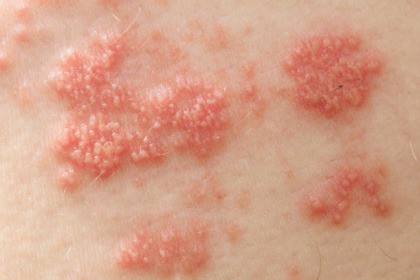
Immunosenescence also sets up older adults for higher risk of viruses. An example of this is chickenpox. Chickenpox can lay dormant in the nervous system for years. Later it can become the painful condition known as shingles. Shingles is very common in older adults, according to the Mayo Clinic [13].
Although immunosenescence may be inevitable to some degree as we age, it doesn’t have to determine the fate of your health. Upping the number of healthy bacteria in your gut can go a long way toward slowing its progression.
The connection between gut health and immune system function is crystal clear, and that includes older adults as well. Remember the fact we shared earlier – roughly 80% of our immune system cells reside in the gut!
A clinical trial conducted by researchers at the Gut Health and Food Safety Research Program and the Institute of Food Research at the University of East Anglia in Norwich, UK [14], found that upping healthy probiotics through healthy food and other means can reduce the severity and frequency of infection in the frail elderly. This study, of course, is just one of many that points towards gut health as key in overall immune boosting for older individuals.
Prebiotics and Probiotics for Seniors

Research suggests that the “sweet spot” in improving your immune health in general as you age is to consume lots of probiotics in the form of whole foods and supplements as well as dietary prebiotics.
PREbiotics are specific fibers that act as “food” for beneficial probiotic bacteria in your gut. Prebiotics are obtained from foods. Here is a list of some foods [15] which are considered excellent sources of prebiotic materials:
- Garlic
- Onions
- Leeks
- Asparagus
- Root vegetables such as sweet potato
- Jerusalem artichokes
- Green bananas
- Honey
- Apple cider vinegar (unpasteurized)
- Spirulina and Chlorella
- Dandelion greens and roots
Researchers with the University of Reading study mentioned earlier also found that consuming both probiotics and prebiotics could decrease the inflammation associated with aging. Research at the University College Cork in the UK describes similar results.
“A combination of prebiotic (dietary) and probiotic agents may prove most effective in targeted modulation of the microbiota,” write the authors in the journal Aging Health [16].
Make Your Senior Years Truly Golden
Getting older doesn’t have to mean suffering with your health! Besides eating right, moving your body, and managing stress, supplementing with the best high-quality probiotics formula you can find just makes sense if you are over 45, and especially if you are over 60.
When it comes to your health as you age, focus on improving your gut health and you simply cannot go wrong. Make your golden years your best years – stay healthy, vibrant, and active with the help of life-enhancing probiotics!
Organixx ProBiotixx+ formula contains a single, super-strain of Lactobacillus plantarum, designed to help alleviate constipation… eliminate gas and belly bloat… support your entire immune system… and give you total digestive protection.
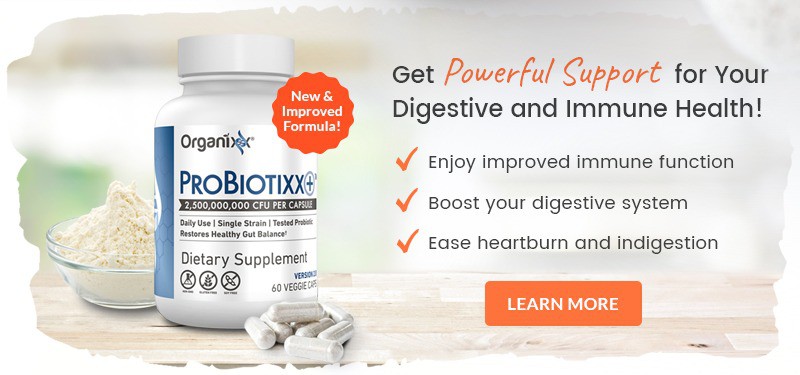
Gut microbiome balance is something that women desperately need for their unique bodies. If you do not have enough beneficial probiotics (i.e., “good” bacteria) in your system, the “bad” bacteria and fungi can run wild in your gut and lead to disease, plain and simple.
Hippocrates, the father of modern medicine, knew this close to 2500 years ago when he said that all disease originates in the gut. We now know that the majority of our immune system cells reside in the digestive tract. In addition, a gut imbalance can lead to leaky gut and chronic inflammation [1], two conditions that have been connected to many major diseases.

According to a recent Harris Poll survey [2], 72% of people have experienced some kind of digestive problem in the previous year. A large percentage of those impacted are women.
Gut-related conditions such as irritable bowel syndrome (IBS) and autoimmune disease [3] affect women far more often than men. In fact, according to 2005 research from the University of California, Los Angeles, and the Mayo Clinic, women are twice as likely to have IBS as men [4]! Read on to discover probiotics benefits for women, including how you can rebalance your gut microbiome and achieve health on all levels.
7 Reasons Why Probiotics for Women’s Health Are Essential
You might not think that tiny little organisms living in your digestive tract can impact your entire body, but they do. Here is a list of just some of the factors that healthy probiotics play a part in:
- Maintaining weight [5]. Probiotics play a role in metabolism, obesity, diabetes, and weight.
- Having a healthy heart [6]. A healthy gut can also help lower blood pressure.
- Keeping a strong immune system. Remember that up to 80% of your immune system cells are in your upper gastrointestinal tract!
- Balancing hormones. Certain kinds of healthy bacteria have a direct effect on a woman’s key hormones, such as estrogen.
- Reproductive health. Healthy probiotics can reduce pathogens aimed at the vagina and other reproductive areas.
- Detoxification. Probiotics support proper liver function [7].
- Preventing chronic disease.
The Candida Overgrowth Epidemic Among Women

For a woman, probiotics support vaginal health, the urinary tract, reproductive health, and hormonal health. Hands down, the one “culprit” that unfortunately can cause an imbalance in all these areas is Candida albicans.
Candida albicans is a fungus, more specifically a yeast, that lives in your mouth and intestines. In the right quantities, it actually has a beneficial job to do in these areas. It’s designed to aid in nutrient absorption and digestion. When there is an overproduction of Candida, however, it can release toxic byproducts. It can also penetrate through the intestinal lining, leading to the condition known as “Leaky Gut [8],” also known as intestinal permeability.
According to the U.S. Centers for Disease Control, four out of five individuals [9] are prescribed antibiotics each year. In women, antibiotic use is one of the main causes of Candida overgrowth, or Vaginal Candidiasis [10].
If you’ve ever experienced a vaginal yeast infection, you know how uncomfortable it can be. But there are other symptoms that oftentimes aren’t so readily recognized as being caused by Candida overgrowth.
Signs of Yeast Overgrowth
Check to see if any of these signs & symptoms apply to you. If so, you may be experiencing yeast overgrowth:
- Fatigue or, in severe cases, fibromyalgia
- Skin and nail infections
- Problems with cognition
- Allergies
- Vaginal infections
- Mood swings, anxiety, and depression
- Strong cravings for carbohydrates and sugar
- Bloating, diarrhea, and constipation

Candida overgrowth can also lead to more severe conditions. A recent investigation conducted at Tufts University in Boston found a link between IBS and Candida overgrowth. According to researchers, the presence of both can create a “vicious cycle in which low-level inflammation promotes fungal colonization and fungal colonization promotes further inflammation [11].”
According to the Mayo Clinic [12], fungal infections like Candida can also infiltrate endocrine organs. This can lead to an imbalance in hormones that are key for female reproductive health, such as estrogen and progesterone.
Finally, autoimmune conditions such as Hashimoto’s, rheumatoid arthritis, and multiple sclerosis can be linked to Candida overgrowth. One 2014 report [13] published in the journal Autoimmune Diseases notes that autoimmune conditions, in general, have “increased dramatically” since World War II. The study researchers connect this with increased environmental toxins which have created “gut dysbiosis [14]” (i.e., gut flora imbalance) that have allowed opportunistic microorganisms to flourish.
What Causes Probiotic Imbalance in Women?
There are as many routes to gut imbalance as there are individual women. However, researchers have identified at least five main ways in which gut flora can be compromised and opportunistic microorganisms like Candida can start to run amok. Amongst those are:
- Too much alcohol consumption
- Smoking cigarettes [15]
- Eating too many simple sugars and carbs
- Antibiotic use
- Emotional stress

Today, women are more stressed-out than ever before. They are more likely than men to report having “a great deal of stress,” according to a survey done by the American Psychological Association [16]. What’s more, women were more likely than men to report physical and emotional symptoms related to stress. Thirty-two percent said that they have had stress-related digestive upset over the past month.
Make no mistake about it, emotional stress can have a huge effect on a woman’s gut health. Chronic stress can create alterations in the “gut-brain” connection, which can worsen already existing digestive disorders. It can also create changes in gastric secretions [17] and increase intestinal permeability.
Lifestyle Changes & Probiotics for Women That Can Help
The good news is that there are some easy ways to turn both stress and Candida overgrowth around! The first step is to focus on self-care. This means taking specific actions that help your body, mind, and spirit, that can lower stress and that promote a healthier and happier you. Some actions include:
- Meditating
- Exercising
- Staying hydrated
- Taking relaxing baths
- Getting a
massage - Connecting with supportive friends
- Being in nature
- Participating in enjoyable hobbies
- Doing work you feel passionate about
- Eating a healthy, whole foods diet, including lots of cultured vegetables and prebiotic foods

Another super easy yet very effective way to turn around gut health is to supplement with a quality probiotic formula every day. Hands down, research confirms that taking a probiotic is one of the best things a woman can do for her digestive health. (Go here for more on probiotic benefits for seniors.)
A study [18] conducted by the National Center for Toxicological Research found that the probiotic Lactobacilli can suppress certain pro-inflammatory genes in a woman’s vaginal area. The findings suggest that probiotic supplementation can significantly help with yeast infections as well as boost cancer protection in vaginal epithelial cells.
Other studies have made the connection between probiotics and improvements in anxiety and depression. Healthy bacteria affect the brain via the “gut-brain axis (GBA).”
Italian researchers writing for the Annals of Gastroenterology explain this as the “bidirectional communication between the central and the enteric nervous system, linking emotional and cognitive centers of the brain with peripheral intestinal functions [19].” These same researchers connect conditions such as IBS with many central nervous system/brain-based disorders, including autism and anxiety-depression.
Hands down, studies indicate that probiotics work to inoculate the gut with helpful bacteria and turn digestive issues around (and many times other health conditions, too!).
Getting the Good Gut Bacteria You Need
Many women are reluctant to talk about gut health. They’re embarrassed by symptoms which may include bloating, cramping, nausea, and gas. Two-thirds of women surveyed in the Harris Poll were uncomfortable with talking about their gut issues even with their friends.
Women are in crisis when it comes to gut health, but it doesn’t have to be that way. There are ways you can be proactive about healing gut imbalance. Reducing stress (see self-care list above) and including daily probiotic supplements that supply the good gut
It all starts with awareness and education. You’ve just learned about the substantial probiotics benefits for women. If you’re a woman, don’t let your body suffer. Take action that can not only lead to digestive health but contribute to whole-body health and healing.
Organixx ProBiotixx+ formula contains a single, super-strain of Lactobacillus plantarum, designed to help alleviate constipation… eliminate gas and belly bloat… support your entire immune system… and give you total digestive protection.

Research into the role probiotics play in health has exploded over the last decade or so. We now know more about
What Are Probiotics Used For?

Before we dive into the specifics about L. plantarum, let’s discuss why probiotics are essential for your health in the first place. Probiotic means “for life.” In a nutshell, probiotics are “good” bacteria you typically consume via food or supplement form. They support life by protecting you from harmful parasites, viruses, and “bad” bacteria that can cause sickness and disease.
Probiotics and Gut Health
Almost everyone has heard that probiotics are good for digestive health. What you may not know, however, is that probiotics are also essential for:
- healthy metabolism
- heart health [1]
- mental health
- immune system health
- balancing hormones [2]
- managing weight [3]
- keeping allergies at bay
- preventing chronic disease
- supporting your liver
- …and so much more!
Remember that your digestive system is home to up to 80% of all your immune cells. The result? You simply cannot survive and feel good without the right amount and the right kind of probiotics. And perhaps the most important type of beneficial bacteria for your overall health is Lactobacillus plantarum.
What Makes Lactobacillus Plantarum Probiotic So Special?

A decade ago we heard very little about the gut microbiome and “good” and “bad” bacteria, but all that has changed.
As mentioned earlier, Lactobacillus plantarum, or L. plantarum, has recently been the focus of much research and is a rising “superstar” amongst probiotics. What’s interesting is that it’s a very common kind of beneficial bacteria found in cultured vegetables.
L.
This barrier prevents pathogenic bacteria such as E. coli from penetrating the lining of your gastrointestinal tract and entering your bloodstream.
L. Plantarum Withstands Antibiotics Better Than L. Casei
The Lactobacillus

One Chinese investigation [4] conducted in 2015 compared the survival rate of Lactobacillus
The researchers discovered that L.
Experts agree that if you need to take antibiotics, an adequate amount of L.
Landmark 2017 Study: L. Plantarum Saves Newborn Lives
People of all ages need a healthy amount of L. plantarum in their digestive tract for overall good health. This is especially true for the very young

Sepsis is a dangerous and life-threatening blood infection that causes major injury to tissues and organs, often resulting in death. According to a World Health Organization (WHO) report (gathering data from the Indian National Neonatal Perinatal Database), sepsis is the most common cause of neonatal death in that country [8].
It is also responsible for 30% to 50% of newborn deaths in all developing countries. While the numbers are smaller, sepsis is a leading cause of neonatal death in the United States as well [9].
A recent study sponsored by the U.S. National Institutes of Health (NIH) in conjunction with the University of Nebraska Medical Center and institutions in India had a very promising outcome. Over 4,000 pregnant women participated in the study that found an L. plantarum probiotic regimen lowered the incidence of sepsis in newborns by up to 40% [10].
Other Positive Benefits for Newborns
The researchers also found that the L. plantarum probiotic regime had other positive side effects for the newborns. In addition to reducing rates of sepsis, these babies also had an 82% lower rate of Gram-positive bacterial infections and a 75% reduction in Gram-negative bacteria. This, in turn, led to healthier babies overall, with 34% fewer cases of pneumonia and other respiratory infections.
The researchers stated in a press release for the NIH that the introduction of the probiotic “may have boosted immunity throughout the entire body, not just in the digestive system [11].”
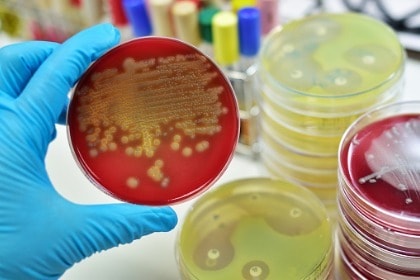
Amongst the common opportunistic Gram-positive bacterium that can create disease states in humans are:
- Streptococcus
- Staphylococcus
- Corynebacterium
- Listeria
- Bacillus
- Clostridium
Gram-negative bacterial infections are difficult to remedy as they tend to be hardier and more resistant to antibiotics [12].
The NIH study is an amazing testament to the power of one simple probiotic and its ability to literally save lives. Because of this, pregnant mothers may be well advised to discuss with their doctors how to ensure sufficient quantities of L. plantarum during pregnancy.
Lactobacillus Plantarum & Digestive Disorders
In addition to its benefits for babies, L. plantarum can be extremely beneficial for those with digestive disorders such as irritable bowel syndrome (IBS), Crohn’s disease, and colitis.

In a Polish clinical trial [13], all participants who were given Lactobacillus plantarum in liquid form experienced less abdominal pain and regulation in stool consistency.
The researchers also alluded to the possibility that L. plantarum may someday become part of regular treatment for IBS.
How L. Plantarum Crowds Out Golden Staph and Other Bad Bacteria
One of the reasons why L. plantarum probiotic is so effective against some of the most aggressive opportunistic bacterium as well as the most common digestive complaints has to do with its unique genetic makeup. We stated earlier that one of the unique characteristics of L. plantarum is its ability to “adhere” to the intestinal wall.
The specific type of adhesion, called “mannose-specific adhesions,” makes it possible for L.
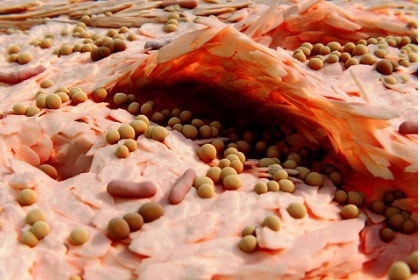
Another unique characteristic of L.
In a February 2019 report published in the journal Microbial Pathogenesis [15], researchers found that anti-microbial properties in both L.
Both of these characteristics and more provide evidence that L. plantarum can be a powerful aide for individuals with specific digestive conditions.
Some research has also discovered that Lactobacillus
Sources of L. Plantarum
Luckily, L. plantarum can be found in many foods. It is a plant-based bacterium (as its name indicates) and appears in abundance in foods such as kimchi, sauerkraut, and cultured vegetables.
Still, some experts estimate that only 25% of Americans [18] have L. plantarum colonies in their system, largely due to eating the standard American diet of processed foods, lots of sugar, and unfiltered tap water.
As a result, one of the simplest ways to ensure that you get enough Lactobacillus
You may have grown up thinking that all bacteria are “bad.” Hopefully, now you know better! Opportunistic bacteria can indeed wreak havoc on your system, and even be life-threatening.
What’s going to help keep these “bad guys” at bay are probiotics. And L. plantarum is turning out to be one of the most powerful of them all. It’s one of the “good guys” that all of us need throughout our lives. Be sure you’re getting enough Lactobacillus plantarum in food or supplement form every day.
Organixx ProBiotixx+ formula contains a single, super-strain of Lactobacillus plantarum, designed to help alleviate constipation… eliminate gas and belly bloat… support your entire immune system… and give you total digestive protection.

In today’s busy world, convenience is king. But maintaining a healthy lifestyle when we’re busy can be challenging. A well-balanced diet is often the first thing sacrificed in the name of convenience.
Sometimes it seems our only option is to eat whatever is quick and hassle-free. Our bodies need full-spectrum nutrition, which is hard to find at the drive-through. Even meal-replacement bars and protein shakes branded as “healthy” often contain groupings of ingredients that fail to provide your body the nourishment it needs.
Because these substitutes aren’t whole foods, they lack the variety of fats, carbohydrates, and proteins necessary to synergistically fuel the body. High-Protein “health” foods are often the worst offenders. These foods often contain processed isolates, concentrates, and other refined forms of extracted protein that are nutritionally incomplete.
Fortunately, there is a complete, high-protein food that’s convenient and easy to consume. And it comes from perhaps the most unlikely of sources… crickets!
Crickets are a complete source of protein that contains everything your body needs to stay healthy and vibrant. And once you realize the benefits and how they can be prepared, you’ll discover they’re not as “gross” as you may first think!
Crickets Are a Nutritionally Complete Superfood
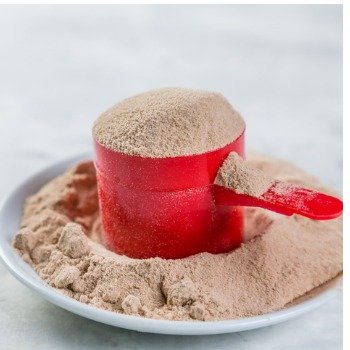 In fact, eating crickets doesn’t have to be icky at all, since they can easily be turned into a fine powder that looks, smells, and tastes about the same as any other protein or food powder on the market.
In fact, eating crickets doesn’t have to be icky at all, since they can easily be turned into a fine powder that looks, smells, and tastes about the same as any other protein or food powder on the market.
The biggest difference is that cricket powder (often referred to as cricket protein powder or cricket flour) is still a whole food – unlike many of its counterparts that are primarily highly-processed, food-like substances that are nutritionally incomplete.
Even a hearty New York strip steak or freshly-grilled chicken breast, both of which are high in protein, pale in comparison to the full-spectrum nutrition found in whole crickets. After all, traditional meats are still technically just one part of the animal – two if you count the fat content.
Conversely, whole crickets are roughly equivalent to an entire cow or chicken (meat, fat, bones, ligaments, and all.) Animal bones and ligaments, as you may already know, contain their own unique nutrient profiles that differ from those found in meat and fat.
This is why traditional beef or chicken stock recipes call for steeping these otherwise non-edible animal parts in boiling water for many hours: to extract and infuse their nutrients into a drinkable “bone broth” for use in soups or as a standalone beverage.
But none of this is necessary with crickets, which in powder form are like a steak, vegetables, and bone broth all rolled into one. Ounce for ounce, crickets contain twice the amount of protein as beef. And we’re talking the best kind of protein – containing all nine essential amino acids.
Crickets also contain three times the amount of iron and five times the amount of magnesium as beef, plus many other vital nutrients including vitamin B12 and omega-3s.
Crickets Are Easily Digestible
All these nutritional goodies, including the protein, digest quickly and completely without putting immense strain on the body. Many people have trouble digesting meat, for instance, because it can take many hours for the digestive system to fully break it all down.
But this isn’t the case with cricket protein powder, which is quickly converted into amino acids, B vitamins, omega-3 fatty acids, and many other vital nutrients that the body can use quickly.
To put things into perspective, a single cricket, were you to consume it whole, contains a whopping 60-70% pure protein. Beef, on the other hand, contains anywhere between 17-40% protein.
And when converted into powder, the protein composition averages about 50% of its volume, the majority being basic amino acids which serve as fundamental building blocks for creating muscle tissue, hormones, neurotransmitters, metabolic pathways, and pretty much every other function of the human body [1].
Because they exist in “primitive” form, amino acids absorb directly into the body almost immediately. They skip the digestive regimen that occurs for whole proteins to be broken down by digestive acids and enzymes for the body to use them.
Many people who have trouble digesting meat and other high-protein foods prefer cricket protein powder as a gut-friendly alternative.
One study that looked at eight different varieties of edible insects found that, in general, the protein digestibility of insects like crickets is exceptionally high. None of the insects evaluated had a protein digestibility score below 7%, and some were as high as 96% [2], further suggesting that crickets are a viable alternative to traditional meat-based foods.
Crickets Help Support a Healthy Gut
Another thing that sets crickets apart regarding their overall nutritional value is a nutrient called chitin, which serves as fuel for the body’s gut microbiome. If you’re at all familiar with probiotics and their role in maintaining healthy digestion, chitin is basically a “prebiotic” that helps to maintain healthy probiotic function. Just like how probiotics help to fuel digestive health, chitin helps to fuel probiotic health while optimizing the digestive process.
By helping microbiota in the digestive tract to flourish, chitin inadvertently helps to protect against pathogenic invasion as well, meaning it plays a crucial role in thwarting chronic disease by providing dietary immune support. Since it’s also a dietary fiber, chitin further helps to promote maximum nutrient absorption.
Besides shellfish and mushrooms, there aren’t any other natural sources of chitin that most people eat on a regular basis. This adds to the uniqueness of crickets, which seem to function as a type of gut-supporting “miracle food” by helping to counter the harmful impact of gut-damaging “anti-nutrients” and other poisons commonly found in processed foods.
Keeping in mind that the gut and brain are profoundly interconnected, cricket consumption can also provide powerful support for the central nervous system. By helping to balance the living organisms that live inside the stomach and small intestine, the nutrient composition of crickets may provide support in the maintenance of healthy inflammation levels, while also helping to boost neurocognitive function [3].
Organixx ProBiotixx+ formula contains a single, super-strain of Lactobacillus plantarum, designed to help alleviate constipation… eliminate gas and belly bloat… support your entire immune system… and give you total digestive protection.
Chances are you’ve read or heard about the numerous health benefits of fermented foods such as sauerkraut (cabbage) and other veggies, kombucha drinks, and even fermented dairy products such as yogurt and kefir. But have you heard of the advantages of fermented supplements? If not, read on! If you want to get the best bang for your supplement buck, then fermented supplements from a quality source is definitely something to consider.
Your Gut Health Depends on Your Gut Bacteria
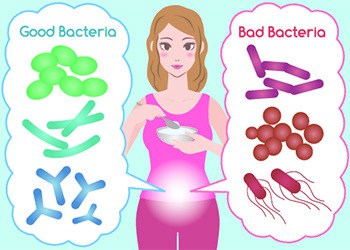 Did you know that there are trillions of tiny organisms living in your digestive tract? These go by different names including gut flora, intestinal flora, gut bacteria, or even microbiota.
Did you know that there are trillions of tiny organisms living in your digestive tract? These go by different names including gut flora, intestinal flora, gut bacteria, or even microbiota.
Collectively this biological system in known as the “microbiome.” You can remember it this way… you have trillions of microbiota in your microbiome, which resides in your GI tract, or gut.
Now some of these microbiota are healthy for you. They are helpers and may assist in everything from food assimilation to the creation of T Cells for your immune system. Other bacteria, however, are not so helpful. In fact, they can be downright dangerous and often lead to all kinds of digestive and other health issues.
When it comes to gut health, the name of the game is to have sufficient quantities of the good bacteria in your gut at all times that outnumber the “bad.” That’s not to say that a little bit of the “bad” bacteria isn’t important as well. Having a small quantity of bad bacteria keeps the helpful bacteria, as well as your immune system in general, primed and ready to go.
Since our environment, lifestyle, and the foods we typically eat provide plenty of opportunities for harmful bacteria to flourish, our ongoing job is to keep that supply of good bacteria coming into (and thriving in) our gut. We do this by eating the right kinds of foods (and eliminating harmful ones), drinking plenty of filtered water for detoxifying, and getting the right kinds of supplements for our unique needs.
Foods that Help or Harm Your Microbiome
Some of the ways you may be putting your microbiota out of balance and taxing your digestive system include:
- Lack of fermented foods in your diet
- Lack of probiotics in your diet
- Lack of prebiotics in your diet
- Insufficient enzyme-rich foods
- Diet high in carbohydrates and sugar
- Diet high in poor quality fats
- Too many inflammatory foods, too few anti-inflammatory foods and substances
- Foods laden with antibiotics, preservatives, toxins, and chemicals
- Alcohol
- Lack of polyphenols and resveratrol
- Too few antioxidant-rich foods
Why Fermentation is Good for Your Gut Health
Fermentation is “the chemical breakdown of a substance by bacteria, yeasts, or other microorganisms, typically involving effervescence and the giving off of heat.” It has been used (accidentally and on purpose) since antiquity. Prior to electricity and refrigeration, fermentation was (and still is) a way to make wine and beer and to preserve all categories of foods, including meats. Because bacteria are responsible for the fermentation process, when you eat fermented foods you bring a dose of these probiotic or good bacteria (“probiotic” means “pro-life”) into your digestive system.
Some of the health effects that many people report feeling from consuming fermented foods include reduced stress, less fatigue, higher antioxidant content, improved mood, and a boosted immune system!
In general, fermentation does some very important things in your body. It helps pathogens be destroyed more rapidly, it strengthens the barriers between your blood supply and your GI tract (when this barrier is weak, you may be at risk of “leaky gut”). It also introduces very helpful antimicrobials into your system, such as bacteriocins, which are tiny amino acids that stop the growth of harmful bacteria.
Most important to our discussion here, fermentation helps enhance the vitamin and mineral content of whatever is being fermented. You guessed it: this goes for vitamin, mineral, and herbal supplements as well!
9 Ways That Fermentation Helps to “Super-Charge” Your Supplements
Basically , what fermentation does for food it can also do for your supplements, and then some! Research shows that fermenting vitamins, minerals, and herbs before encapsulating them can enhance them in a number of ways:
, what fermentation does for food it can also do for your supplements, and then some! Research shows that fermenting vitamins, minerals, and herbs before encapsulating them can enhance them in a number of ways:
- Increased antioxidants – fermentation can increase the antioxidant properties of your supplements, which means that your bones, immune system, and intestinal lining are all getting super antioxidant support.
- Increased bioavailability – it can increase the bioavailability of vitamins and minerals such as vitamin B, magnesium, zinc, and many others. (Making something more “bioavailable” means making the nutrients more available for your body to absorb.)
- Natural preservative – fermentation can protect against spoilage as fermentation is a natural preservation process. While fermentation is a chemical process, it doesn’t rely on the addition of harmful chemicals.
- Boosts anti-inflammatory potential – it boosts the potential of anti-inflammatory substances such as capsicum significantly.
- Enhances amino acid content – fermentation makes amino acids more available, including in freeze-dried and powdered green drink mixes and protein powders. One study found that fermentation of organic, sprouted brown rice protein powder enhanced both the amino acid content as well as the bioavailability of the product as a whole.
- Enhanced Chelation – fermentation of substances such as chlorella and spirulina can enhance their ability to chelate (bind with) heavy metals.
- Better absorption – it helps your supplement become absorbed in your GI tract more effectively.
- Formation of new nutrients – fermentation of certain plants and other foods may actually form phytonutrients and other nutrients that weren’t there before. For example, a report published in the International Journal of Food Science and Nutrition found that naturally fermenting fenugreek leaves not only enhanced levels of pyridoxine and ascorbic acid (vitamin C), but actually created vitamin B12, which was not in the herb before fermentation.
- Supports healthy cells – consuming fermented foods in any form helps your cells stay pliable and toxin-free!
Are Fermented Foods & Supplements for You?
Adding fermentation into your diet in some way every day simply needs to be part of any good digestive health protocol. There was a time when “going fermented” was a fun and interesting adjunct to an otherwise fairly healthy diet. Or perhaps you think that eating fermented foods is just for people who are “sick.” Times have changed, however.
The toxic burden we’re all exposed to on a daily basis is much higher and our stress levels are greater than ever. Chances are your digestive system and your body as a whole may be feeling the effects of these burdens more and more. If you’re not consuming fermented foods on a regular basis, then a good quality probiotic can make a world of difference to your gut health.
When it comes to choosing basic supplements − whether you decide to go fermented or not − be sure to choose quality products that you know do not contain harmful fillers. Check your labels and do a little research before you buy that supplement. Believe it or not, some low quality, mass produced multivitamins and other supplements contain toxins such as hydrogenated oils, artificial colors, titanium dioxide, and worse!
If your budget permits, go for the fermented supplements whenever you get a chance. When it comes from a quality source, you’ll be getting more of the good things you want (and your body needs) in a supplement.




